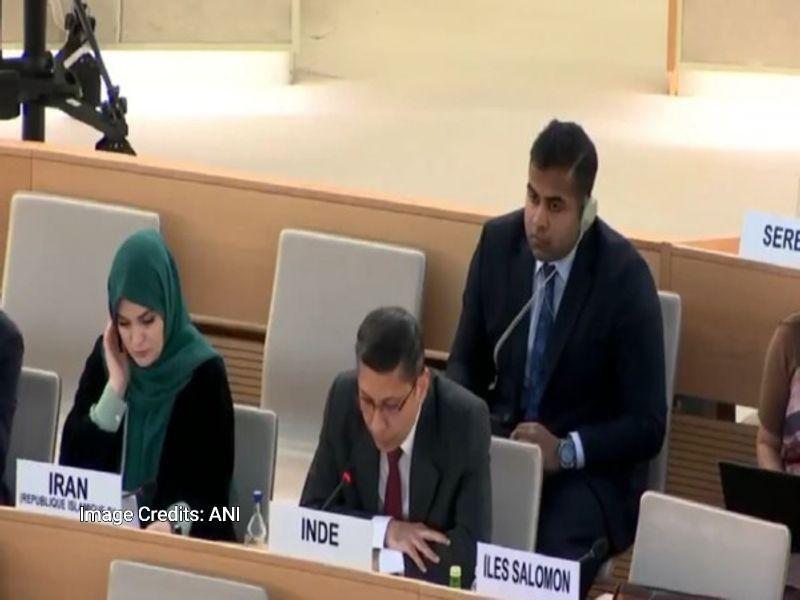
Unfounded, Baseless: India on UNHRC Chief Remarks on J&K, Manipur
India has hit back at the United Nations Human Rights Chief, Volker Türk, for his recent remarks on Jammu and Kashmir (J&K) and Manipur. The country’s permanent representative to the UN, Arindam Bagchi, described the statement as “unfounded and baseless.” In his remarks, Türk expressed concerns over the restrictive laws in J&K and called for addressing the violence in Manipur. India, however, has termed his statement as “cherry-picking” and a failure to acknowledge the country’s democratic achievements.
Türk’s statement was made during a session of the UN Human Rights Council (UNHRC) on March 16, where he addressed the human rights situation in various countries, including India. He expressed concerns over the restrictions on freedom of expression and assembly in J&K, which has been under various forms of lockdown since August 2019, when the Centre revoked its special status under Article 370 of the Constitution. The move was met with widespread protests and violence, resulting in the loss of several lives.
Türk also drew attention to the human rights situation in Manipur, where he called for addressing the violence and promoting dialogue between the government and various groups. The state has been plagued by insurgency and violence for decades, with various groups demanding greater autonomy and rights for the indigenous people.
India’s permanent representative to the UN, Arindam Bagchi, responded to Türk’s statement by saying that it was “unfounded and baseless.” He emphasized that India is a healthy, vibrant, and pluralistic society, where the rights of all citizens are protected and respected. Bagchi pointed out that India has made significant progress in promoting human rights, including the establishment of several human rights institutions and the passage of laws to protect vulnerable groups.
“We are a country that is committed to the promotion and protection of human rights, and we have made significant progress in this regard,” Bagchi said. “We are a country that is committed to the promotion and protection of human rights, and we have made significant progress in this regard.”
Bagchi also hit out at Türk for what he called “cherry-picking” and highlighting only the negative aspects of India’s human rights situation. He emphasized that India is a country with a diverse population, and that its human rights record is not uniform across all regions and communities.
“We have made significant progress in promoting human rights, and we are committed to continuing this progress,” Bagchi said. “We are a country that is committed to the promotion and protection of human rights, and we have made significant progress in this regard.”
India’s response to Türk’s statement has been seen as a strong rebuke to the UNHRC chief, and it has sparked a heated debate on social media and among human rights activists. Some have criticized India for its response, saying that it is an attempt to deflect attention from the human rights issues in J&K and Manipur.
However, others have defended India’s response, saying that it is an attempt to correct the record and set the facts straight. They argue that Türk’s statement was biased and lacked a nuanced understanding of the complex human rights situation in India.
The controversy has also highlighted the complex and often contentious relationship between India and the UNHRC. India has been a vocal critic of the UNHRC, saying that it is biased against developing countries and lacks a democratic mandate. The country has also criticized the UNHRC for its lack of transparency and accountability.
In recent years, India has been critical of the UNHRC’s handling of human rights issues, particularly in its own backyard. The country has accused the UNHRC of unfairly targeting India and other developing countries, while ignoring human rights abuses in other parts of the world.
The controversy has also raised questions about the role of the UNHRC in promoting human rights around the world. Some have argued that the UNHRC’s focus on human rights issues in India is an attempt to undermine the country’s sovereignty and interfere in its internal affairs.
Others have defended the UNHRC’s role, saying that it is an important institution that plays a vital role in promoting human rights and holding governments accountable for their actions. They argue that the UNHRC’s mandate is to promote and protect human rights, and that it has a responsibility to address human rights abuses wherever they occur.
In conclusion, the controversy surrounding the UNHRC chief’s remarks on J&K and Manipur is a complex and contentious issue that highlights the complex relationship between India and the UNHRC. While India has defended its human rights record and criticized the UNHRC chief’s statement as “unfounded and baseless,” others have criticized India’s response and called for greater accountability and transparency in the UNHRC’s handling of human rights issues.






